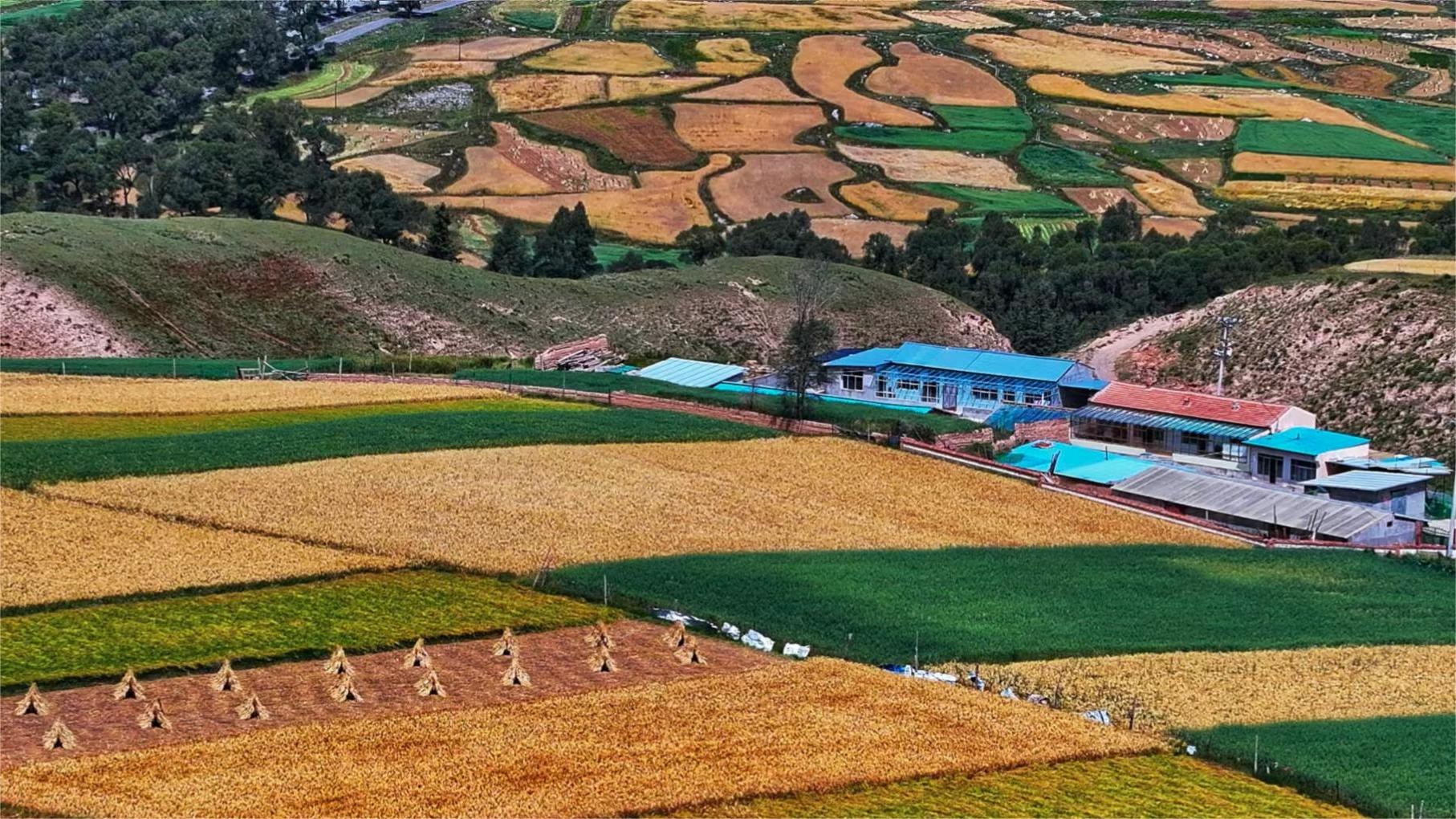'Strange' keepers in giant panda costume escort China's 'national treasures' to wild
Recently, Chinese researchers confirmed the "romance" between two giant pandas, Tao Tao and Hua Yan, who were both rewilded and released into the wild.
This is the first time in China that two giant pandas reintroduced into the wild have been observed engaging in courtship behavior.
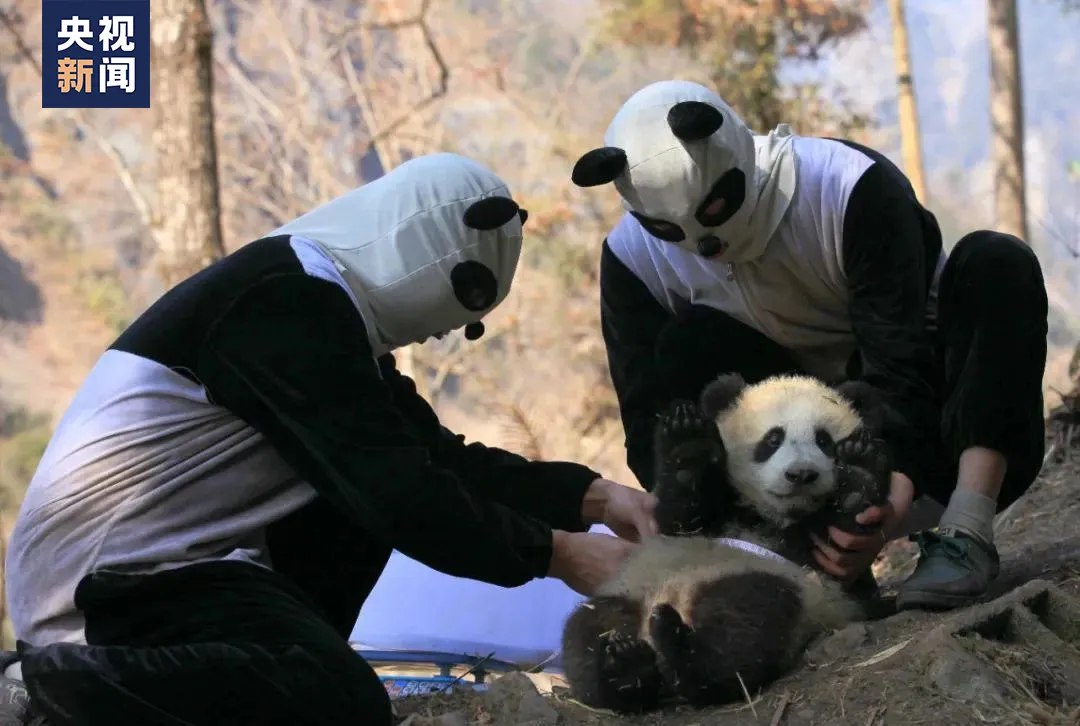
Giant panda keepers, disguised as giant pandas, conduct a physical examination on a giant panda cub. (Photo/CCTV News)
So far, the China Conservation and Research Center for the Giant Panda has released 11 captive giant pandas back into their natural habitats, with nine of them surviving.
Among them, seven have successfully integrated into the endangered group of wild giant pandas living in the Xiaoxiangling Mountains in southwest China's Sichuan Province, and two have successfully blended in with the wild population in the Minshan Mountains, also in Sichuan.
This achievement is of significant importance for the revitalization of endangered small, wild populations of giant pandas.
Behind it is China's giant panda rewilding program operated by a group of researchers and giant panda keepers.

Mou Shijie, a giant panda keeper at the China Conservation and Research Center for the Giant Panda, patrols in the wild in disguise of a giant panda to monitor a giant panda cub undergoing rewilding training. (Photo/CCTV News)
In order to revitalize the populations of wild giant pandas, the China Conservation and Research Center for the Giant Panda has been training captive giant pandas in survival skills and releasing some of them into the wild after they are deemed capable enough of independent foraging and avoiding their natural enemies.
During the rewilding process, giant panda keepers need to disguise themselves as giant pandas to prevent the animals from becoming dependent on humans, according to Mou Shijie, a giant panda keeper at the China Conservation and Research Center for the Giant Panda.
Keepers often wear a giant panda costume, and spray giant panda urine or apply giant panda feces on their clothes to make themselves more like giant pandas whenever they interact with them, Mou said.
Mou has cared for and monitored 10 of China's 11 giant pandas returned to the wild, and the male giant panda Tao Tao is the first giant panda reintroduced into the wild that he has been responsible for since starting his job.
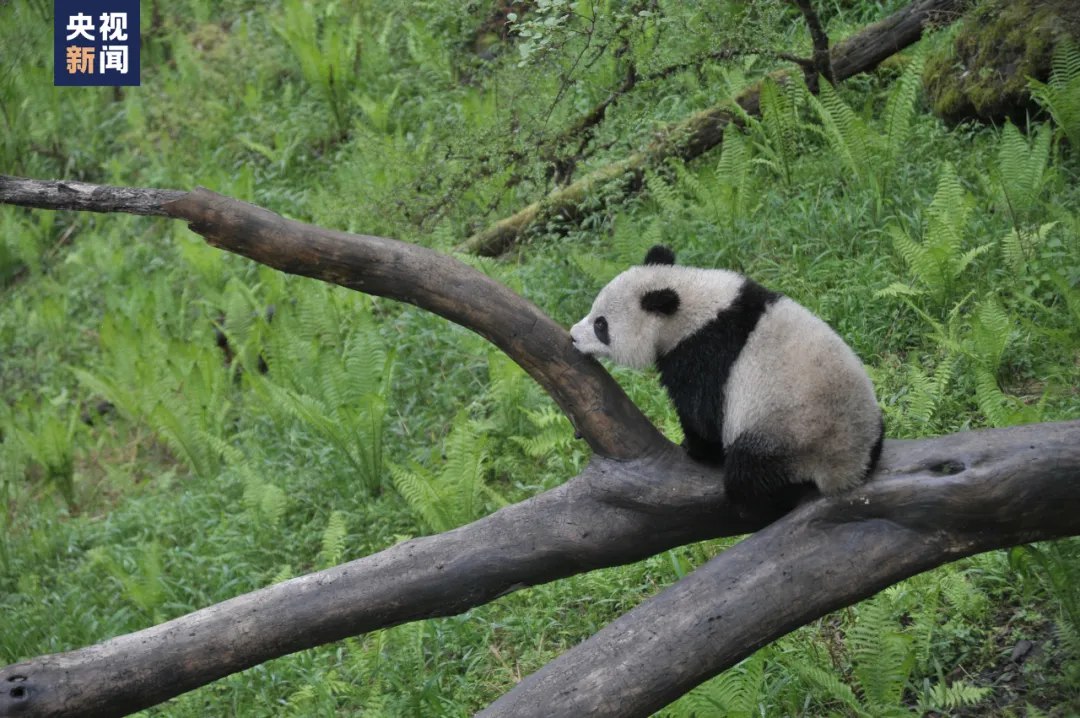
Photo shows Tao Tao, a male giant panda reintroduced into the wild in China after going through rewilding training. (Photo/CCTV News)
"Strange" and "invisible" giant panda keepers
In an effort to make sure the chosen giant pandas learn survival skills better and faster, the rewilding program has introduced a model under which giant panda mothers, especially those with a strong maternal instinct and experience in living in the wild, are allowed to live with their cubs and teach them survival skills.
Tao Tao is the first giant panda of the China Conservation and Research Center for the Giant Panda to undergo this "mother-cub" rewilding training.
According to Mou, rewilding training for giant pandas generally goes through two stages.
The first stage begins with the birth of the cub and ends when the cub is around 1 year old, during which the cub lives in a small training enclosure simulating a natural environment, feeds on mother's milk, and primarily learns basic skills like climbing trees from its mother.
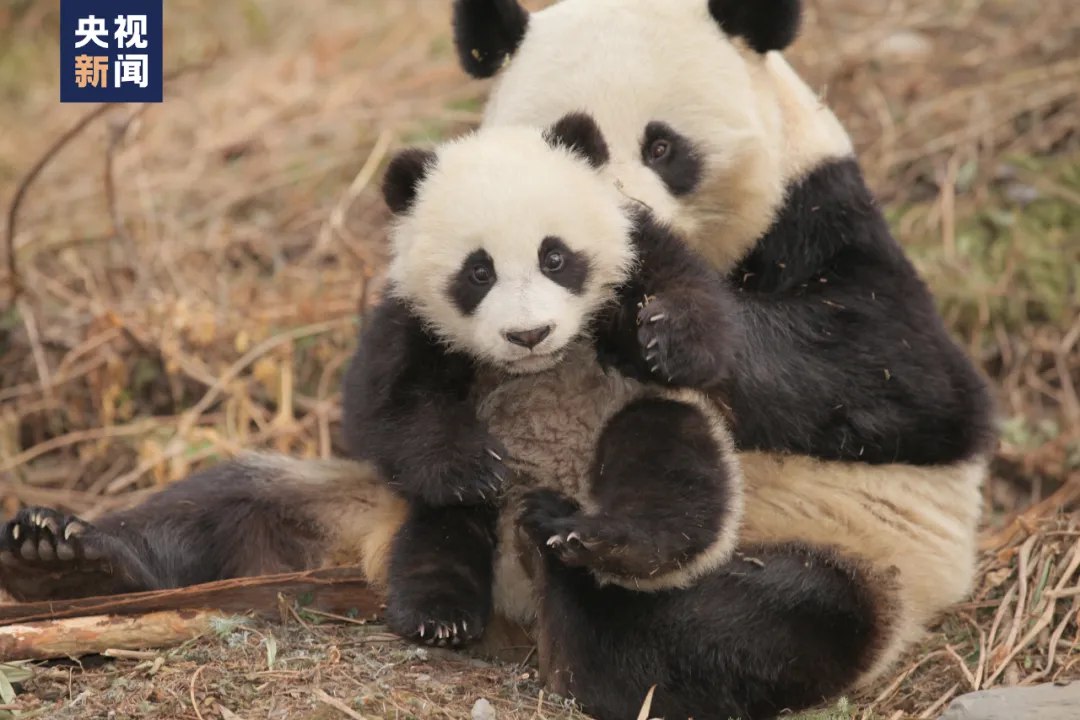
Tao Tao and its mother. (Photo/CCTV News)
The second stage starts when the cub's diet gradually transitions from mother's milk to bamboo. During this stage, the giant panda mother and cub are moved to a larger rewilding training enclosure adjacent to their natural habitat, providing a completely natural environment where the cub can start independently foraging with its mother, learning skills like avoiding their natural enemies and finding water.
Giant panda keepers must always remain "invisible" throughout the rewilding process, so as to minimize human interference in the training, according to Mou.
Their giant panda costume might be a little strange, but it has worked well for "deceiving" the cubs.
Once when Tao Tao saw Mou in giant panda costume, it immediately climbed up a tree to hide, Mou recalled.
"I guess it might have felt that this 'giant panda' was very different, but it wouldn't come up with the concept of 'humans'," Mou said.
During the second stage of the rewilding training for Tao Tao, Mou and his colleagues needed to closely monitor the actions of the giant panda mother and cub.
They patrolled in the wild every day, with a round trip taking over four hours. Sometimes they had to trek outdoors for a whole day during times of heavy rain or snow.
The keepers needed to locate the "mother and son" based on the GPS collar around the neck of the giant panda mother to observe their activities and mental states from a distance, according to Mou.
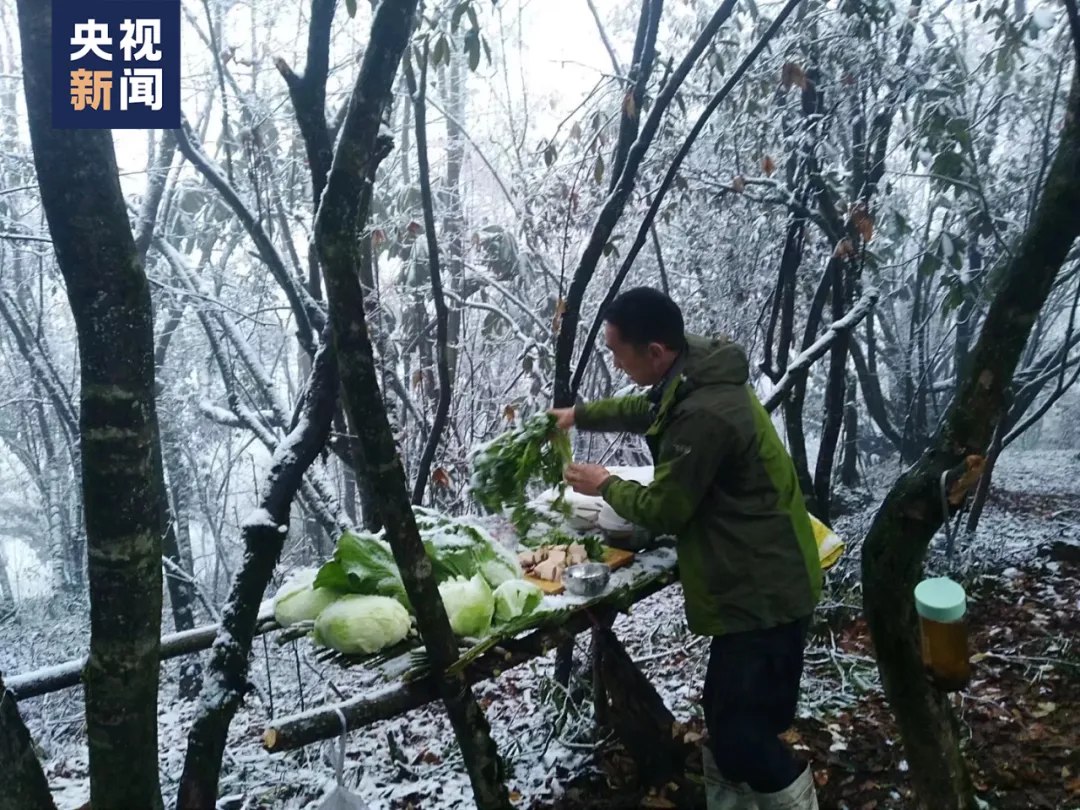
Mou Shijie, a giant panda keeper at the China Conservation and Research Center for the Giant Panda, prepares food for a giant panda mother. The giant panda mother is arranged to teach survival skills to its cub as part of the rewilding training for the cub. (Photo/CCTV News)
"We also needed to avoid the cub, and separately lure the mother to feed it with supplementary nutrient-rich food. Additionally, we needed to regularly collect data from the recording device worn by the mother, analyze their activity patterns, as well as collect and bring back fecal samples," Mou said.
The "mother-cub" rewilding training model is effective, according to Mou.
He remembers how he and his colleagues were so concerned that the bamboo would be covered by snow after a sudden snowstorm that they entered the wild enclosure to check on Tao Tao and its mother, only to find that they already found food and were happily rolling in the snow.
"It's difficult for humans to teach cubs how to survive, but giant panda mothers can," Mou said.
After silently caring for Tao Tao for two years, two months, and seven days, Mou bid farewell to Tao Tao. At that time, Tao Tao was able to live independently from its mother and returned to nature after a comprehensive assessment.
Wilder cubs, happier keepers
Unlike giant panda keepers in zoos, Mou and his colleagues cannot have close contact with giant pandas and may face various dangers in their wild work environment.
While searching for the traces of giant pandas undergoing rewilding training, Mou and his colleagues not only encounter fierce wild animals but also may face harsh weather conditions. Sometimes, "disobedient" cubs can also increase their workload.
However, giant panda keepers are happier when the cubs exhibit their natural wild behavior more.
When the giant panda Qin Xin was going through the second stage of its rewilding training, it managed to escape the electronic fence of its wild enclosure five times, according to Mou.
It has even "run away" during the day and returned to find its mother at night, he recalled.
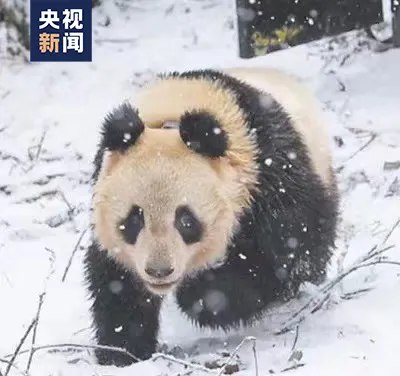
Photo shows Qin Xin, a giant panda reintroduced into the wild in China after going through rewilding training. (Photo/CCTV News)
Although Mou and his colleagues had to expand their search range and closely monitor its safety, they were genuinely happy.
"Qin Xin was very wild and full of vitality. It has completely mastered the skills taught by its mother," Mou said.
Currently, three pairs of giant panda mothers and cubs are undergoing rewilding training at the Hetaoping Base of the China Conservation and Research Center for the Giant Panda in Sichuan. They are expected to venture deep into the jungle in the future, embarking on their new life.
Every time they watch the rewilded giant pandas step further away, staff members at the China Conservation and Research Center for the Giant Panda are filled with reluctance. But they also eagerly anticipate that these adorable and vibrant lives will embrace more possibilities in the wild.
"I have watched them grow from just over 100 grams at birth to over 50 kilograms. When it's time to say goodbye, my heart is filled with mixed emotions. But I sincerely wish them well and hope they can be safe and sound in the wild, as that is where they truly belong," Mou said.
Photos
Related Stories
- Group birthday party held for giant pandas in Sichuan
- Giant pandas enjoy special 'cakes' at collective birthday ahead of Mid-Autumn Festival in SW China's Sichuan
- Ultimate guide to panda tours in China
- Giant panda Meng Meng’s twin cubs ‘gaining strength’ nearly 3 weeks after birth
- Giant panda celebrates 14th birthday in Bogor, Indonesia
- Beloved giant pandas in Japan to return to China in September
- Mainland-born giant panda celebrates 20th birthday in Taipei
- First giant panda cub born in Russia turns one year old
Copyright © 2024 People's Daily Online. All Rights Reserved.








